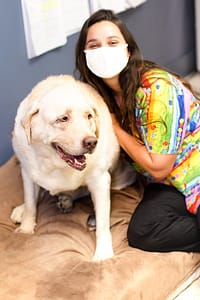New Puppy & Kitten Vet Care
Getting your new puppy or kitten off to a healthy start sets the stage for their lives as healthy adults. Regular physical examinations, core and elective vaccinations, fecal testing for parasites, and deworming are all important elements of ensuring good health for your puppy or kitten. Our knowledgeable staff can help your family learn about potty training your pup, performing nail trims on your puppy or kitten, dietary recommendations, and potential health hazards for your new pet.
Spaying and neutering are additional topics to consider; the appropriate age for the timing of sterilization surgery may vary upon the species and breed of your pet. You may also want to consider Pet Health Insurance – a great way to get your new little family member off to a good start. Last but not least, you’ll also want to consider whether your new puppy or kitten may need preventives such as monthly prevention, and flea/tick preventives. We realize that adding a new family pet can come with lots of questions… but don’t forget, we’re here to help, so please don’t hesitate to call.

Senior Pet Care
- Arthritis
- Dental Disease
- Heart Disease
- Liver Disease
- Kidney Disease
- Endocrine Disorders
- Vision Loss
- Hearing Loss
- Cancer/Growths


